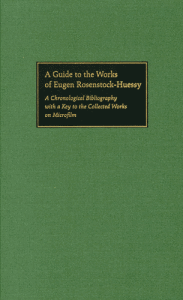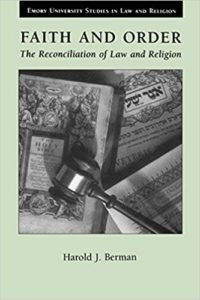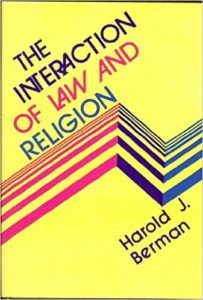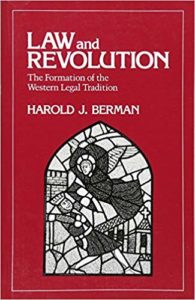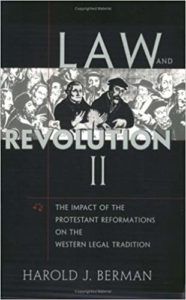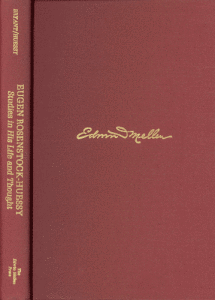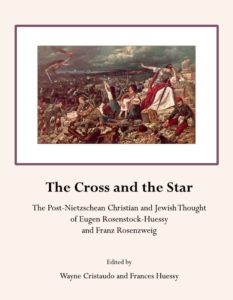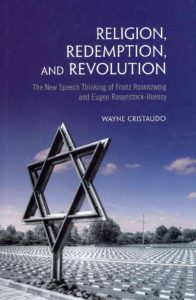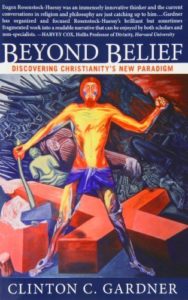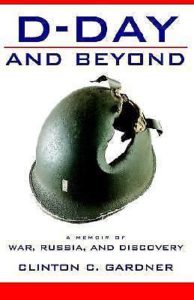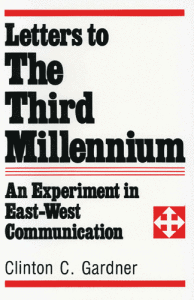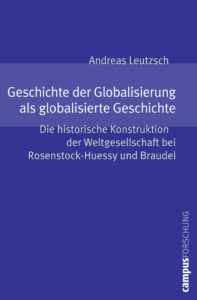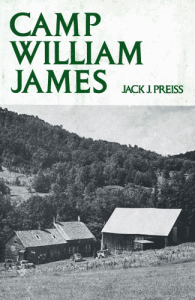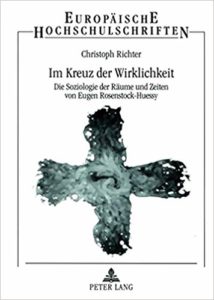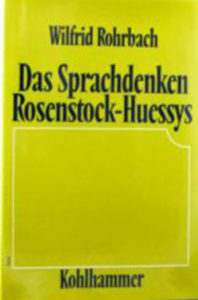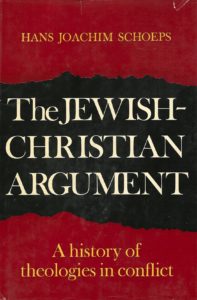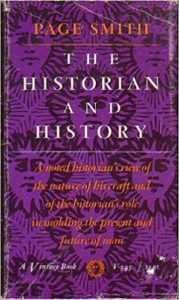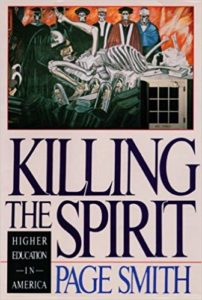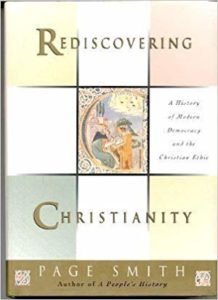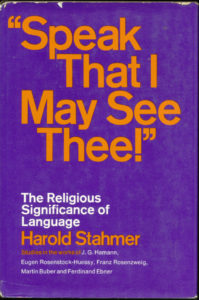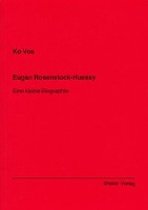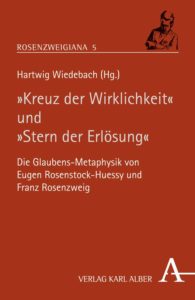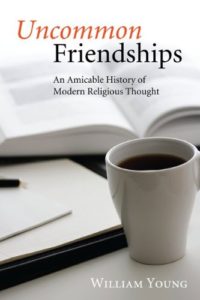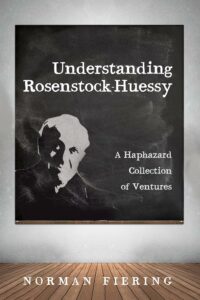Books about Rosenstock-Huessy

Books in several languages are listed below, alphabetically by author. The list begins with Harold J. Berman’s many books, but there are plenty of other authors represented here, as you will see if you scroll down past his works. If you would like to offer a book on this page, please contact the Fund here. Books in Dutch may be bought from RESPONDEO.
Faith and Order The Reconciliation of Law and Religion
Harold J. Berman
The Interaction of Law and Religion
Harold J. Berman
Law and Revolution The Formation of the Western Legal Tradition
Harold J. Berman
Law and Revolution II The Impact of the Protestant Reformations on the Western Legal Tradition
Harold J. Berman
Eugen Rosenstock-Huessy Studies in His Life and Thought
edited by M. Darrol Bryant and Hans R. Huessy
Seventeen writers respond to the work of Rosenstock-Huessy in papers given at the first international conference on Rosenstock-Huessy, held at Waterloo, Ontario, in June of 1982. The conference marked the first time that those who had known Rosenstock-Huessy personally and those who knew him only through his books had a chance to meet and discuss their experiences. Edited by Rosenstock-Huessy's son and heir, Hans R. Huessy, and the host of the conference, Darrol M. Bryant, this book offers insights from both communities.
Edward Mellen Press, 1987. Hardbound, 270 pages.
Most of the book’s contents may also be found on the Conferences page of this website.
The Cross and the Star The Post-Nietzschean Christian and Jewish Thought of
Eugen Rosenstock-Huessy and Franz Rosenzweig
Wayne Cristaudo, and Frances Huessy (eds.)
Religion, Redemption and Revolution The New Speech Thinking of Franz Rosenzweig
and Eugen Rosenstock-Huessy
Wayne Cristaudo
Cristaudo’s effort to present the basic features of Rosenzweig’s and Rosenstock-Huessy’s thought [as] a welcome and important contribution to the field… Presenting the two thinkers together is to offer correctives to the scholarship on Rosenzweig… Cristaudo identifies important and understudied themes in Rosenzweig’s work and sheds light on these topics by juxtaposing his and Rosenstock-Huessy’s thought... [The] book makes... a strong case for the relevance of Rosenzweig’s and Rosenstock-Huessy’s thought in contemporary philosophical and religious debates.Cristaudo proposes a religious view in which the central issue is not the existence of God, but the love which overpowers people and redirects our lives, the process to which we give the name of "God." This book is not only of tremendous value for people interested in Jewish-Christian dialogue, but for people interested in history and the needed exchange between our Western heritage and pre-Western and pre-Christian ways of life. Toronto: University of Toronto Press. 2012
Beyond Belief Discovering Christianity's New Paradigm
Clinton C. Gardner
D-Day and Beyond A Memoir of War, Russia, and Discovery
Clinton Gardner
Letters to the Third Millennium An Experiment In East West Communication
Clinton C. Gardner. Argo, 1981.
This book is Gardner's first attempt to introduce the general public to Rosenstock-Huessy’s work by relating his own personal thoughts and experiences. In his preface, Gardner writes: "What Rosenstock-Huessy was getting at does not lend itself to formal studies. We should try to speak with him, rather than analyze what he said. He does not offer some finished new ‘philosophy.’ Rather, in all his varied works, he asks us to join him in his search for a new, non-ideological language to describe who we are and where we are going."
The book, which first appeared in 1981, is written as a journal of the 1970's, recording trips to Moscow, Canton, Delhi, and Berlin. It also contains a selective bibliography, a brief biography of Rosenstock-Huessy, notes, and an index. (In 2017, the blogger Harley Voogd gave it 4 stars out of 5 on GoodReads.)
Hardbound and paperback, 272 pages.
When the Going Was Good American Life in the Fifties
Jeffrey Hart
Planetary Responsibilities An Ethics in Timing
Otto Kroesen. Wipf and Stock, 2014. Edited by Frances Huessy. Foreword by Wayne Cristaudo.
This book represents a major philosophical breakthrough--not only in ethics but more generally in the human sciences. For it succeeds in doing two major things. First, it identifies the aspects of responsibility and reality (interior as well as exterior) with which the major ethical paradigms and orientations are preoccupied. Second, it brings ethics itself into a bigger conversation with the human and social sciences... introducing three different modalities of time into the picture: the different times of (1) daily decisions, (2) biography, and (3) "history as such." There is one other important aspect to the book that should be mentioned. Its framework is deeply indebted to... Eugen Rosenstock-Huessy. It was Rosenstock-Huessy's ambition in his magnum opus, Soziologie... to radically transform the human or social sciences by what he called a grammatical method. He argued that what we are and express, long for, and make of our past, present, and future are grammatically encapsulated communications--a function of speech between souls... Otto Kroesen has taken Rosenstock-Huessy's method and applied it to the great ethical dilemmas we face today. Most conspicuously--after taking us through the major different philosophical alternatives within ethics today, and relating them to the role played by organizations in shaping our existence--he reflects upon the great spiritual traditions that are the enormous forces "trajecting" behind all the peoples of the world. Arching over this book is the great question of how creative concord can be achieved in a world that is open now to vastly different forces that have been shaped by enormous technological, commercial, geopolitical and administrative forms. These forms pull us all, with our vastly different traditions, priorities and social memories, into a common world.Kroesen asks how social dialogue can create a common support base for dealing with change, and how economics and politics can be organized around such interaction, to prevent a clash of civilizations. Differences should not be erased; instead, they must be coordinated by timely alternation. By listening to the times and to each other, we create a common understanding of the way forward. The Christian heritage of Western modernity must be combined with older layers of culture from the East and the South, since we all have to find our way by making creative use of many traditions. Such intercultural management contributes to the re-creation of the planet and, in the process, people find their personal destiny within a planetary biography. Wipf and Stock, 2014. Paperback, 226 pages.
Geschichte der Globalisierung als globalisierte Geschichte Die historische Konstruktion der Weltgesellschaft
bei Rosenstock-Huessy und Braudel
Andreas Leutzsch
Speech and Society The Christian Linguistic Social Philosophy of Eugen Rosenstock-Huessy
by George Allen Morgan with a Comprehensive Bibliography by Lise van der Molen.
University Presses of Florida, 1987.
George Allen Morgan had a uniquely broad knowledge of Rosenstock-Huessy's writings; his insights into that corpus are contained in this scholarly primer of Rosenstock-Huessy’s thought.
Morgan met Rosenstock-Huessy at Harvard in 1934. He had just completed his doctorate in philosophy under Alfred North Whitehead and was preparing his classic work, What Nietzsche Means; the younger man would later play a major role in the genesis of Rosenstock-Huessy's The Christian Future. After WWII, Morgan spent 23 years as a career foreign service officer and diplomat; in his retirement, he spent fifteen years making notes on all of Rosenstock-Huessy’s many books and articles, and this compact and beautifully written volume is the result.
The book is divided into three parts. The first, entitled "Fundamentals," begins with the elements of Rosenstock-Huessy’s "speech-thinking": the grammatical method and the cross of reality. The second, "Historical Perspectives," addresses Rosenstock-Huessy's view of pre-Christian, Christian, and post-Christian history. The third, "Selected Aphorisms", contains a magnificent collection of them. An early edition of Lise van der Molen’s bibliography is also included. (Speech and Society is out of print.)
Hardbound, 220 pages.
Camp William James
Jack J. Preiss. Argo, 1978.
In the last chapter of his book, The Christian Future, Rosenstock-Huessy wrote in 1945: "Our peacemakers and planners must be supported by camps all over the globe, where youth, recruited from every town and village all over the globe, serves. This service must implement the global organization as the young must experience what the old are planning before the old can have any authority."
In statements dating back to 1912, Rosenstock-Huessy has shown himself to be the prophet of the United States Peace Corps. He was among the first to set up voluntary service camps in Europe after the First World War. In the United States, at the invitation of President Roosevelt, he undertook to reform the Civilian Conservation Corps by turning it into a universal service, open to young persons from all walks of life. That story is told inCamp William James. From the preface by the American historian Page Smith, who was a member of the original camp:Today when the Congress of the United States considers proposals to reestablish, along new lines, a corps of young people volunteering for national environmental service, it is instructive to note that many of the issues as to the proper role, recruitment, and organization of an "ecology army" were first confronted and debated by the founders of Camp William James. When the state of California set up, in 1976, its own "California Conservation Corps," it helped to draw attention once more to the issue of service by young people as "The Moral Equivalent of War."… There could therefore be no more appropriate time to retrieve the history of Camp William James, the first practical effort to give effect to the idea of national service in time of peace."
Paperback and hardbound, 272 pages.
Im Kreuz der Wirklichkeit: Die Soziologie der Räume und Zeiten von Eugen Rosenstock-Huessy
Christoph Richter
Das Sprachdenken Eugen Rosenstock-Huessys Historische Erörterung und systematische Explikation
Wilfrid Rohrbach
The Jewish-Christian Argument A History of Theologies in Conflict
Joachim Schoeps
The Historian and History
Page Smith
In a highly critical 1964 review, C. Vann Woodward wrote: "Smith... rejects... the idea that 'history must analyze the behavior of social groups' rather than 'mediate the past to the present generation.' ...Mr. Smith finds it 'hard to imagine a better system' to kill American history as a humane study than the one that prevails in our colleges at present.'"
In Smith's 1995 New York Times obituary, William Honan called The Historian and History "[Smith's] most disputed work... a witty indictment of American historians. In the book he observed wryly that there were then 15 'trained and presumably productive' people with doctorates in the field for every year of the nation's history... far more than is necessary... especially when most were absurdly overspecialized, slavishly addicted to textbooks in their areas and foolishly pretended to objectivity... Championing a story-telling approach to historical writing, he argued that 'great history has always been narrative history, history with a story to tell that illuminates the truth of the human situation, that lifts spirits and prospects to new potentialities.'"
Killing the Spirit
Page Smith
Rediscovering Christianity A History of Modern Democracy and the Christian Ethic
Page Smith
Speak That I May See Thee The Religious Significance of Language
Harold Stahmer
"In the book Speak That I May See Thee, Harold Stahmer, with the help of Walter Ong, shows how irrational it would be not to expect God to address humankind in language."
—Anthony Thiselton
Speak That I May See Thee explores the religious significance of language, especially the spoken word, as revealed in the writings of J.G. Hamann, Eugen Rosenstock-Huessy, Franz Rosensweig, Martin Buber, and Ferdinand Ebner. Dr. Stahmer evaluates the contributions of these men in light of concerns that are decidedly more American than European character; he avoids the more traditional theological and analytic philosophical approach is to language, preferring instead to examine the potentially sacramental nature of all forms of human discourse, from a right variety of perspectives. Stahmer says that "one hopes that the studies will contribute to an understanding and appreciation of the significance of the writings of these men, and perhaps inspire others to add to and correct, where necessary,those themes and issues treated here. And it is hoped that these studies will enable people from all walks of life, especially those outside the framework of institutional religion, to enhance their respect for and confidence in the potentially secret character of human speech." Stahmer's interest in the importance of oral and aural themes in Western man’s earliest development is combined with, first, the concerns of those writers interested in human communication in an electronic age (Marshall McLuhan, Walter J. Ong, S.J.) and, second, with the implications of radical religion, religionless Christianity, and death-of-God themes. Above all, Speak That I May See Thee explores the role of speech in the creation of them are truly human society. As such it will speak to those interested in literature and communication, as well as those concerns with religious, phenomenological, and existential themes. New York: MacMillan. 1973Ins Kielwasser der Argo Herforder Studien zu Eugen Rosenstock-Huessy
Knut Martin Stünkel (ed.)
A Guide to the Works of
Eugen Rosenstock-Huessy A Chronological Bibliography with a Key to the Collected Works on Microfilm
Compiled by Lise van der Molen. Argo, 1996.
This definitive, updated edition is a restructured and expanded edition of Lise van der Molen's bibliography, now organized chronologically, and alphabetically within each year. The alphabetical short-title list enables the user to find references quickly and efficiently. The contents of the Guide can also be found on the "Interactive Bibliography" page here on this site.
Hardbound, approximately 200 pages.Eugen Rosenstock-Huessy Eine kleine Biographie
Ko Vos
“Kreuz der Wirklichkeit” und “Stern der Erlösung” Die Glaubens-Metaphysik von Eugen Rosenstock-Huessy
und Franz Rosenzweig
Hartwig Wiedebach, (ed.)
Uncommon Friendships An Amicable History of Modern Religious Thought
William Young
Understanding Rosenstock-Huessy A Haphazard Collection of Ventures
Norman Fiering
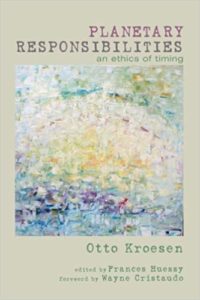
Planetary Responsibilities
Otto Kroesen. Wipf and Stock, 2014. Edited by Frances Huessy. Foreword by Wayne Cristaudo.
Buy this book from:
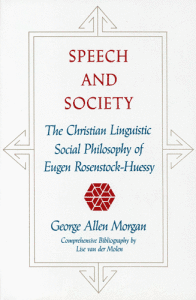
Speech and Society
by George Allen Morgan with a Comprehensive Bibliography by Lise van der Molen.
University Presses of Florida, 1987.
Buy this book from:
